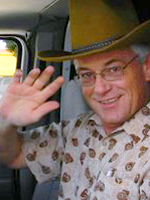Pointing fingers in death of Princess Di
Leon Worden · September 3, 1997
It had all the makings of a fairy tale. The young, pretty kindergarten teacher finds her prince, marries him, moves into his castle, becomes queen and lives happily ever after.
Remember when they met? Buckingham Palace wasn't too sure she would be accepted. Her lineage wasn't quite clear at first. But Charles was in love with her, and he was determined to make everyone else fall in love with her, too.
We studied and watched. We traced her blood lines. We scrutinized her every move. We copied her hair styles. We treated her as if she were entering our own family. She was the child bride of the world, and by the time of the wedding, we had fallen for her. Hard.
She wasn't like any royalty we had ever known. We identified with her colloquial upbringing. She fielded our intrusions with poise and dignity, her glamour offset by her humanity and unpretentiousness. She was a princess for the people, single-handedly bringing the monarchy down to earth and redefining it along the way.
We acted like proud parents when she gave birth to the future king of England. We followed her on holiday to the Alps. We sided with her when she fought with Charles -- poor, bungling, dowdy Charles -- and denounced the monarchy's handling of the situation as her marriage fell apart.
Woody Allen once said that when he entered public life, he realized it meant giving up any right to privacy, and that he didn't expect any. Perhaps any young woman who goes out on a date with a prince should brace herself for the consequences. I don't know.
It was probably inevitable. Under the weight of our relentless lust for gossip she finally snapped. Still we wouldn't let go. Not through her bulimia, not through her suicide attempt. We bought as many copies of National Enquirer, Star and Globe as Time, Newsweek and U.S. News and World Report -- and almost as many copies of TV Guide as all of them, combined. She wasn't a person, she was a soap opera star. We needed to see her frailties. They made her real. Our heroes have to be real.
In spite of us she pulled through. She reinvented herself, proving herself a bright, energetic, strong-willed and yet very feminine woman for the post-feminist period. She inspired women on both sides of the Atlantic.
We admired and respected her courage. We saw her touch leprosy and pediatric AIDS patients, figuratively and literally. We followed her to Bosnia and Angola as she visited victims of land mines. We bought her dresses. We felt for her as she found happiness for the first time in a long time with a new suitor. We made her the most famous woman in the world, certainly bigger than the house of Windsor, with a two-letter moniker that was immediately and universally recognized.
And now she is gone.
And now we play the blame game, as we are so apt to do.
Disbelief turned to frustration and anger early Sunday as the first details reached us.
Will we stop buying National Enquirer now? Will we turn our heads away from the photographs, if they are published?
Will we start letting our public figures control what is known about them? Will we stop insisting that the Fourth Estate expose their warts and show us how they really are? Can we stifle our craving for gossip? Can we do without celebrities? Can celebrities do without us?
Do we love John Wayne any less, knowing he was an alcoholic? Or John F. Kennedy a playboy? Or Liz Taylor a -- well, whatever? Will we force the lines between tabloid and legitimate journalism to become even further blurred, in our demand for instant news?
Where does our fascination with O.J. fit in? Or the Rodney King videotape? Or photos of a local crash scene on the front page of this newspaper? Will we stop calling that damned "Tell It to the Signal" and start taking responsibility for our actions and our opinions?
On Monday we were given a new devil to castigate. Now that we know that someone with a 0.175 blood-alcohol content has 380 times the chance of dying in a solo auto accident than someone who is sober, will we all stop driving drunk?
Who among us is without culpability?
Leon Worden is a Santa Clarita resident. His commentary appears on Wednesdays.
©1997 LEON WORDEN — ALL RIGHTS RESERVED

